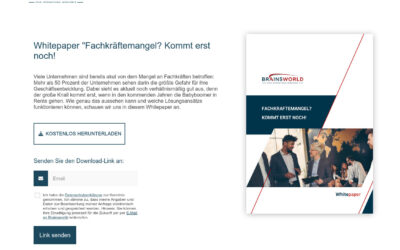New German Skilled Labor Immigration law passed. Something is happening, but is it enough?
Thanks for sharing in your network
On July 7, 2023, the Federal Council passed the Skilled Worker Immigration Act. The rules are to come into force gradually from November 2023. So something is happening when it comes to cutting red tape in the immigration of skilled workers to Germany. What are the key points of the law? Is it really suitable for attracting foreign skilled workers to Germany, including from third countries? And to keep them in the country as well? Here is an update on the legal situation and an assessment of the realistic prospects for companies and skilled workers as a result of the law.
According to the German government, around 1.98 million jobs unfilled in 2022 – time is running out
Germany is still far from attracting the 400,000 skilled workers per year that we need to maintain our competitiveness and prosperity. On the one hand, not enough specialists are coming into the country, and on the other, many leave after a while. According to the OECD, Germany ranks 15th in the global ranking of attractiveness for skilled workers, still behind countries such as Finland or Portugal (as of March 2023). The reasons why qualified immigrants do not feel comfortable in Germany are complex. The struggle with the bureaucracy and its hurdles, which are getting out of hand in many places in this country, plays an important role. Added to this are the lack of English language skills in the offices and the not infrequently low level of digitization of the authorities in this country. This, among other things, is where the new Skilled Workers Immigration Act comes in.
What is in the new Skilled Workers Immigration Act? (Source: Federal Government)
Foreign degrees will be recognized: From now on, at least two years of professional experience and a vocational qualification acquired abroad and recognized by the state there will suffice. The qualification no longer has to be recognized in Germany beforehand. This means less bureaucracy and shorter processes. However, the minimum salary threshold, which has now been lowered, must be reached.
Minimum salary threshold lowered: The minimum salary threshold for the EU Blue Card will be lowered to 50 percent of the annual contribution assessment ceiling in the general pension insurance scheme. As of January 1, 2023, the income threshold will be 7,100 euros per month in the new German states (2022: 6,750 euros) and 7,300 euros per month in the old German states (2022: 7,050 euros). This limit is therefore halved.
Relief for IT specialists: IT specialists are in particularly high demand in Germany (and not only here). They can already come without a recognized degree. In addition, the salary threshold and length of professional experience will be lowered. Also, IT specialists no longer need to prove German language skills.
Further improvements concern regulations for qualified asylum seekers, family reunification and the influx of applicants from certain Balkan states.
Why laws alone are not enough
This is good news. However, there are also things that need to improve that cannot simply be decided and enforced by immigration law. For example, the country’s relative backwardness in digitizing its bureaucracy and the local authorities‘ English skills, which need improvement, remain. To name just a few factors that make it difficult for foreign professionals to feel welcome and ultimately comfortable in Germany.
Brainsworld.io accompanies foreign IT professionals and companies of all sizes through the entire recruiting process – from matchmaking to dealing with the authorities and looking for accommodation, right through to the first day at the new workplace. For this purpose, we use a strategically built network and access to talent pools in South America, Asia and Africa. Our own customized digital platform for international recruiting simplifies the complex processes and ensures that the benefits and facilitations provided by the legislation can also be used effectively.
Image credits: AI tool Divi
You might also be interested in …
Internationales Recruiting Trends – Wohin geht die Reise?
[shariff]Danke für's Teilen in Ihrem NetzwerkInternationales Recruiting Trends | Auch wenn es viele nicht mehr hören können: Der Fachkräftemangel in Deutschland ist mehr als ein Mythos oder das übliche “Klagen der Kaufleute”. Er ist ein immer deutlicher werdendes...
brainsword.io @Hinterland of Things Konferenz – Warum wir Fachkräfteeinwanderung brauchen
[shariff]Danke für's Teilen in Ihrem NetzwerkAuch in diesem Jahr war brainsworld.io wieder auf der Hinterland of Things Konferenz in Bielefeld, um für unser Anliegen eines starken Wirtschaftsstandorts durch Fachkräfteeinwanderung aus Drittländern Flagge zu zeigen. Am...
Fachkräfte suchen im Ausland | Wo lohnt sich die Suche über vernetztes Internationales Recruiting?
[shariff]Danke für's Teilen in Ihrem NetzwerkPrinzipiell rekrutiert Deutschland bereits Fachkräfte aus verschiedenen Regionen der Welt, um dem Arbeitskräftemangel in Schlüsselindustrien zu begegnen. Und durch die Umsetzung wirksamer politischer Maßnahmen und...
Wie kann ein optimierter Recruiting Prozess die Qualität des Internationalen Recruitings verbessern?
[shariff]Danke für's Teilen in Ihrem NetzwerkGrundsätzlich ist der globale Recruting Prozess ein strukturierter Ansatz zur Gewinnung, Auswahl und Einstellung der besten Kandidaten für eine Stelle. Eine effiziente und effektive Gewinnung von Fachkräften aus dem Ausland...
Fachkräftemangel Statistik & Einblicke: Jetzt kostenfreies Whitepaper downloaden!
Was sagt die Fachlräftemangel Statistik? Wieviel Geld kostet die Entwicklung durch ein sinkendes Wertschöpfungspotenzial? Was sind die demographischen Prognosen bis 2070? Und welche Auswirkungen hat dies alles auf den Arbeitsmarkt? Deutschland unter die Lupe nehmen...
Ausländische Berufsqualifikationen anerkennen lassen – Alles klar? Oder gibt’s noch Fragen?
[shariff]Danke für's Teilen in Ihrem NetzwerkDas seit dem 18.11.2023 geltende Fachkräfteeinanderungsgesetz macht es Arbeitssuchenden aus Drittstaaten und deutschen Arbeitgebern in vieler Hinsicht einfacher. So wurden die Hürden für ein zentrales Thema gesenkt - die...
Global Recruiting – ein Beitrag zur Willkommenskultur in Unternehmen?
[shariff]Danke für's Teilen in Ihrem NetzwerkGesetze zur Erleichterung der Einwanderung von Fachkräften schaffen die Basis dafür, dass Fachkräfte aus Engpassberufen zu uns nach Deutschland kommen und hier bleiben. Damit Maßnahmen der Regierung ihre Wirkung voll...
Blaue Karte EU: Was ändert sich ab November 2023?
[shariff]Danke für's Teilen in Ihrem NetzwerkAb November 2023 kommt die neue Blaue Karte der EU. Sie ist Teil des neuen Fachkräfteeinwanderungsgesetzes und senkt Hürden für die Einwanderung von Fachkräften aus Drittstaaten. Vor allem erweitert Sie den Kreis der...
Chancenkarte: Wirklich bessere Karten für ausländische Fachkräfte und Unternehmen?
[shariff]Danke für's Teilen in Ihrem NetzwerkMit dem neuen Fachkräfteeinwanderungsgesetz vom 7.7.2023 (die Regeln sollen ab November 2023 schrittweise in Kraft treten) kommt auch die Chancenkarte für aussichtsreich Spezialisten aus Drittländern ohne konkretes...
Neues Fachkräfteeinwanderungsgesetz verabschiedet. Es tut sich etwas, aber tut sich genug?
[shariff]Danke für's Teilen in Ihrem NetzwerkAm 7. Juli 2023 hat der Bundesrat das Fachkräfteeinwanderungsgesetz beschlossen. Die Regeln sollen ab November 2023 schrittweise in Kraft treten. Es tut sich also etwas beim Thema Entbürokratisierung der Einwanderung für...










